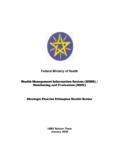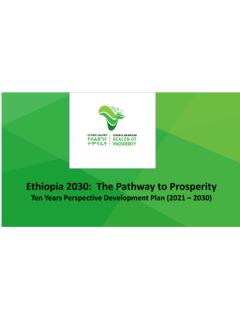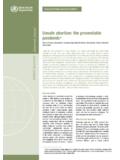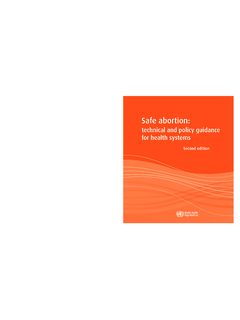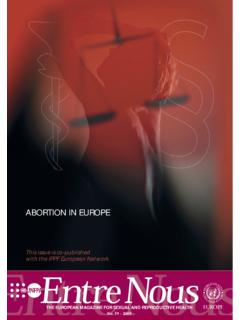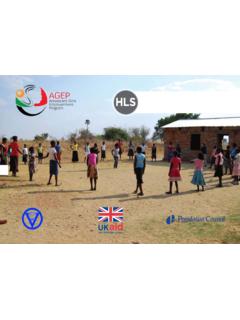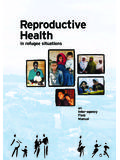Transcription of National Family planning guideline - PHE Ethiopia
1 National guideline . FOR Family planning . SERVICES IN Ethiopia . Federal Democratic Republic of Ethiopia Ministry of health February - 2011. National guideline for Family planning Services in Ethiopia Forward We are only a few years behind the year 2015, the time by which 189 nations, including Ethiopia , pledged to achieve the eight Millennium Development Goals (MDGs). The Federal Government has undertaken several developmental measures towards the achievement of these goals, of which the Plan for Accelerated and Sustained Development to End Poverty (PASDEP) is notable. To this end, the Federal Ministry of health has developed and launched the 20- year rolling health Sector Development Program (HSDP) which has currently reached its fourth stage HSDP IV- with prime priorities being Maternal health , Neonatal and Child health , HIV/AIDS, TB, and Malaria. With the implementation of the Civil Service Reform Program considerable achievement has been gained in transforming customer-based care throughout the health system.
2 Moreover, review of the implementation of HSDP I, II, and III. has indicated that substantial progress has been achieved in the implementation of primary health care through the expansion of the health Extension Program (HEP), and capacity building in human resource and health care facilities. However, there still is concern on the progress for MDG 5 improving maternal health including Family planning service coverage. The Ministry of health has undertaken the initiative for measures to reducing maternal mortality through the provision of clean and safe delivery at the HEP. level, skilled delivery and emergency obstetric care at facility level and most importantly Family planning at all levels of the health care system. It is obvious that meeting 100% of unmet need for modern contraceptive methods will have immediate impact in decreasing unintended pregnancies whose outcome could be postpartum hemorrhage or unsafe abortion, both which are major causes of maternal mortality.
3 Thus the Ministry has undertaken the campaign for sub- dermal insertion of Implanon by the health Extension Workers along with misoprostol for prevention of postpartum hemorrhage. National guideline for Family planning Services in Ethiopia This guideline is developed with the objective of transforming an enabling environment for the implementation of HSDP IV and the subsequent attainment of MDG 5. I believe this guideline , along with a standardized training manual and the revised RH Strategy, will gear the implementation of HSDP IV towards the fulfillment of the MDG milestone. To this end it is imperative that GO/NGOs, CSOs, the private sector and the social market make concerted effort in availing the necessary commodities and services. Finally I would like to congratulate all those who expended their time, knowledge, and logistical support in realizing this document, and call up for a more strategic and concerted effort in its implementation, along with close monitoring and evaluation of its impact.
4 Tedros Adhanom Ghebreyesus (PhD). Minister of health National guideline for Family planning Services in Ethiopia Acknowledgments The Federal Ministry of health of Ethiopia would like to thank Ipas Ethiopia , Integrated Family health Program-Pathfinder-JSI/USAID, JSI/Deliver, UNFPA, WHO, Marie Stapes International- Ethiopia , FHI, Venture Strategy, DKT- Ethiopia and EngenderHealth for major contributions to the development this guideline on Family planning Services in Ethiopia . We also appreciate the contribution of staff delegated from these respective organizations /List Annexed/ who worked hard in the development of this guideline and all those who had been involved in reviewing and giving feedback. The FMOH acknowledges EngenderHealth, in addition to serving as secretary, for covering the cost of actualization of this guideline . Drs Yirgu Gebrehiwot and Solomon Kumbi, consultant Obstetrician/Gynecologists from Addis Ababa University, deserve special thanks for shouldering the task of desk review of National and other countries related documents and development of this guideline .
5 We hope that, this guideline will provide clear guidance concerning Family planning service provision by defining the expected tasks and approaches at all levels of government structure and partners. Dr Keseteberhan Admasu, State Minster of health Federal Ministry of health , Ethiopia National guideline for Family planning Services in Ethiopia Members of the Technical Working Group that had major contributions to the development of this Family planning guideline . Name Organization Atnafu Setegn, BSc, MPH DKT- Ethiopia Ayele Debebe, MD, Obs/Gyn EngenderHealth Ethiopia Berhanu Assefa BSc,MPH FHI. Demeke Desta, MD, MPH Ipas Ethiopia Haregewoin Kiflom RN, BSC,MPH Federal Ministry of health , Ethiopia Kidest Lulu, MD, MPH WHO. Megerssa Kebede, MD, MPH Marie Stapes International- Ethiopia Mengistu Asnake, MD, MPH IFHP-JSI/USAID. Mengistu Hailemariam, MD, Obs/Gyn Federal Ministry of health , Ethiopia Michael Tekie MD, MPH UNFPA. Solomon Kumbi MD, Obs/Gyn AAU-MF, Consultant Tesfanesh Belay, MD, MPH Venture Strategy Woinshet Negatu, BSC, MPH JSI/Deliver Yirgu Gebrehiwot, MD, , Obs/Gyn AAU-MF, Consultant FMOH 5 National guideline for Family planning Services in Ethiopia List of Acronyms AIDS Acquired Immunodeficiency Syndrome ANC Ante natal Care ART Anti Retroviral Therapy BCC Behavioral Change Communication BCG Bacillus Calmette-Guerin BPR Business Process Reengineering BTL Bilateral Tubal Ligation CAC Comprehensive Abortion Care CEDAW Convention on Elimination of all forms of Discrimination against Women CPR Contraceptive Prevalence Rate CYP Couple Year Protection DHS Demographic and health Survey DPT Diphtheria, Pertusis.
6 Tetanus EPI Expanded Program on Immunization FGAE Family Guidance Association of Ethiopia FLE Family Life Education FMOH Federal Ministry of health FP Family planning GBV Gender Based Violence HEP health Extension Program HEW health Extension Worker HIV Human Immunodeficiency Virus HMIS health Management Information System HSDP health Service Development Program HTP Harmful Traditional Practices IBP Implementing Best Practices ICPD International Conference on Population and Development IEC Information, Education and Communication IUCD Intrauterine Contraceptive devise LAM Lactation Amenorrhea Method MDG Millennium Development Goal MDG5 Millennium Development Goal 5. FMOH 6 National guideline for Family planning Services in Ethiopia NGO Non Governmental Organizations PHCU Primary health Care Unit PLWH People Living With HIV. RH Reproductive health RHB Regional health Bureau ROC Reproductive Organ Cancers SDM Standard Days Method STD Sexually Transmited Disease STI Sexually Transmitted Infection TFR Total Fertility Rate UN United Nations VCT Voluntary Counseling and Testing WHO World health Organization WoHO Woreda health Office FMOH 7 National guideline for Family planning Services in Ethiopia Contents Forward.
7 2. Background .. 9. Policy 15. Rationale For Family planning 18. Goals and Objectives of the Family planning 20. Family planning Services .. 23. Family planning Service 28. Services for Clients With Special Needs .. 35. Advocacy communications and social mobilization .. 39. Contraceptive Supplies and 43. Quality of Care In Family planning .. 48. health Management Information System .. 51. FMOH 8 National guideline for Family planning Services in Ethiopia 1. Background health , Population (demographics) and development Population The total population of Ethiopia is nearly million of which live in rural areas and is urban. Females and males constitute and of the total population. Ethiopia 's population is young with an average age of 17 years. The population density is (Census Report 2007). Life expectancy at birth for females and males is years and years, respectively ( health indicators 2009, MoH). Average household size is with urban population having a lesser household size at compared with in the rural population (DHS 2005).
8 The dependent population accounts to of the total population (Census Report 2007). Women aged 15 49 years constitute of the total population. Underfive children account to of the population, and of the total population is under 15 years of age. Adolescents aged 10 19 years, young people aged 15 24 years and youth 10 24 years of age make up , and of the total population, respectively (Census Report 2007). Infant and underfive mortality is showing a decreasing trend. Infant mortality rate is 77/1000 infants and child mortality rate is 50/1000 children giving an under five mortality rate of 123/1000 children. With a crude birth rate of and a crude death rate of population per year the rate of natural increase is every year (DHS. 2000, DHS 2005, health indicators 2009, MoH). The Per-capita income is 330 USD (World Bank 2010). With a decrease in fertility there is a period where the productive segment of the population is expected to increase with proportional economic growth.
9 This phenomenon called demographic bonus' is likely to FMOH 9 National guideline for Family planning Services in Ethiopia occur in Ethiopia in the near future through a well organized Family planning programs and services. health The potential health service coverage is 90%. health service utilization is ( health indicators 2009, MoH). The health service delivery follows a three tier system. The primary health care unit with one health center and five satellite health posts serve 25,000 people. The district hospital with four referring health centers serves 100,000. people. Zonal hospitals and regional referral hospitals provide health care for 1 million and 5 million people, respectively. The cadres of health care providers range from health extension workers that carry out their duties at the community and health post level to medical specialists. The health Policy of Ethiopia boldly states that the health needs of women and children deserve particular attention.
10 The policy recommends decentralizing services and enriching the concept and intensifying the practice of Family planning for optimal Family health and planned population dynamics.. Total fertility rate is children/woman. Contraceptive acceptance rate is The contraceptive prevalence rate in married women is (DHS 2005, health indicators 2009, MoH). Antenatal care attendance, institutional delivery rate and postpartum care coverage though improving is still low at , and , respectively. Child pentavalent3 and measles immunization coverage for under one year old children is and ( health indicators 2009, MoH). Adult HIV prevalence is with a higher prevalence in women % compared to in men. In 2008/9, the number of people that ever accessed ART has reached 152,472 ( health indicators 2009, MoH). FMOH 10 National guideline for Family planning Services in Ethiopia Historical Background and progress of FP programs in Ethiopia Modern FP services in Ethiopia is pioneered by The Family Guidance Association of Ethiopia , FGAE, that was established in 1966.

